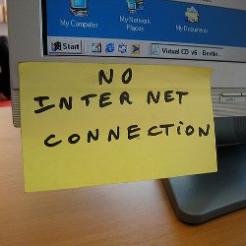It's not hot that there are not-spots says Andrew Samuel, and an online competition to point them out somewhat defeats the purpose, no?
To begin on a positive note, BT have launched a mechanism to, in theory, allow the public to express where there is poor broadband provision which they would wish to see improved, or indeed installed because there is weak or no broadband where they live or work.
The mechanism is actually a competition where the top five places voted for will be the ones which will get super-fast broadband over fibre. And the voting is ... erm ... an on-line poll. So you need internet access to be able to point out that you don't have internet access! It's being called the ‘Race to Infinity' and I can't help but think that it's a bit of a skewed race when areas where more people are online will obviously result in more votes than where there is no access. BT Infinity tweeted my organisation after I'd made a previous comment on this and they suggested I was "a little misleading" because the winning count is not volume based but percentage based. Quite irrelevant, if people don't have broadband access, how can they vote!?
We have not-spots in the UK and many more slow-spots too. No-one reading this need be reminded of the immense benefits of being online. This is no different for voluntary groups, charities and community organisations who equally need to share their work, celebrate their achievements and reach out to those in need who they support. So not having broadband access is a very real disadvantage for many people and groups. The link between digital exclusion and social exclusion is well documented. But what I think we forget too easily is that this island of ours has quite a lot of green bits, rural bits, and remote bits. People live and work in these places which have long-lacked internet access, let alone the availability of high-speed broadband. Not-spots are not limited to rural communities of course, there are many in suburban areas and even in streets of major towns.
I don't want this blog to come across as a BT-bashing piece, the reality is that they are a business who do profitable stuff like any other business. They are not solely responsible for achieving 100 per cent fibre coverage for every last one of us in the Kingdom. What perplexes me to the point of annoyance though is why they seem to have such a defensive policy of simply trotting out the mantra that "99 per cent of UK households can get broadband connectivity". This coverage map paints a rather different picture and I just can't figure out why they are so sensitive about it.
Anyway, at least this undertaking will provide more 'on the ground' evidence of where the gaps and not-spots are. So please tell everyone you can about this and get to libraries, UK Online centres, internet cafe's or wherever possible to plug in your postcode and register the fact that your broadband service needs upgrading or, as I keep saying, needs installing in the first place.
I dearly hope that BT will publish the results in full after the vote closes in December and not just the top 5 which managed the highest percentage of votes. Anyone out there who is well versed with lobbying could help try to ensure that they do.
Visit http://www.racetoinfinity.bt.com where you can see the leading five areas of deprivation that are most in need of development.









